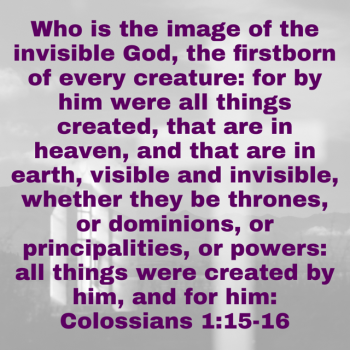I don't.
Christology: Jesus Christ
The term “christology” (from Greek christos meaning “anointed one” or “Christ”) refers to the study of Christ. It often includes such topics as the preexistence and eternality of Christ, OT prophecies about Christ, Christ’s humanity, deity, and incarnation, as well as the issue of his temptations and sinlessness, his death, resurrection, ascension and exaltation, return, three-fold office, and states.
The Preexistence of Christ
There are several texts in the NT that speak in one way or another to the preexistence of Christ. John says the “word” became flesh which implies that he had existed previous to his incarnation (John 1:1, 14). Jesus himself suggests his preexistence in a number of texts.
He said he had glory with the father before the world was (John 17:5)
and that he had come from the father (John 5:43; 6:38). These imply preexistence.
Paul also, in referring to Christ as the last Adam, implies his preexistence since Jews often held that both Adam and Moses were preexistent. So also when he says that Christ was “rich,” but then became “poor,” that he was “in the form of God,” but “humbled himself,” that he was “before all things” (Col 1:17). Both these references refer to the humiliation of the incarnation and therefore suggest that Christ existed previous to his coming to earth (see 1 Cor 15:45; and Phil 2:6).
Prophecies About Christ
Taken in the light of the entire canon, the historical fact of the resurrection, and with a view to Jewish hermeneutics, there are many prophecies about Christ in the Old Testament. Some of the familiar ones include: his birth (Gen 3;15; Gal 4:4); his lineage (Gen 49:10; Luke 3:33); his place of birth (Micah 5:2; Luke 2:4-7); his Galilean ministry of compassion and judgment (Isa 9:1-2; Matt 4:14-16); that he was the prophet to come (Deut 18:15, 18-19; Acts 3:20, 22); that he would function as a priest (Psalm 110:4; Heb 5:5-6); his betrayal (Psalm 41:9; Luke 22:47-48); his being sold for thirty pieces of silver (Zech 11:11-12; Matt 26:15; 27:1-10); his violent death (Zech 12:10; John 20:27); his resurrection (Psalm 16:10; Luke 24:7; Acts 2:25-28); his exaltation to God’s right hand (Psalm 110:1; Acts 2:33-34), his eternal reign in fulfillment of Davidic promise (2 Sam 7:12-16; Psalm 110:1; Isa 55:3; Acts 2:33-34; 13:22-23, 32-34).
The Humanity of Christ
There are several lines of evidence in the Scripture which converge to prove that from a Biblical point of view Jesus was truly and thoroughly human. Jesus had human names (i.e., Jesus, Son of David), was experienced by others as a human being (John 9:16), had a body (1 John 1:1), spoke normal human language(s), referred to himself as a man (John 8:40); others referred to him as a man (Acts 3:22); experienced life as a human being (Luke 2:52), including such limitations as hunger (Matt 4:2), thirst (John 19:28), tiredness (John 4:6), intense sorrow and distress (John 11:35; Luke 13:34-35), and ignorance (Mark 13:32); he had a human soul (Luke 23:46), and died (Hebrews 2:14-15).
The Deity of Christ
There are also several lines of evidence in Scripture which converge to prove that the Biblical writers regarded Jesus as human, but as more than human as well. They considered him divine.
John says he was divine or God (John 1:1). Paul says he
is the “very form of God” (morphe theou; Phil 2:6) as well as
our great God and savior (Titus 2:13).
He is referred to as Lord (Matt 2:43-45), Yahweh (cf. Rom 10:9, 13 and Joel 2:32) as well as the King of Kings (a designation a Jew such as John would only give God himself—Rev 19:16). He does the works of God, including creating (John 1:3; Col. 1:15-20), sustaining (Heb 1:3-4), saving (Matt 1:23), raising the dead (John 5:25); judging (John 5:27), sending the Spirit (a work assigned to the father as well; see John 14:26; 15:26), and building his church (Matt 16:18). He accepts, as God himself does, worship from all men (Matt 14:33) and angels (Heb 1:6) and some day all men will bow to him (something only God accepts; Phil 2:10, Isa 45:23).
So we see that the doctrine of the simultaneous deity and humanity of Christ is not the invention of some fourth or fifth century church council (e.g., Nicaea [AD325] or Chaledeon [451]), but is clearly taught in Scripture.
The precise formulation (i.e., a working model) of how this could be so may have had to await a response to the Arian heresy and other Christological developments (and a borrowing of Greek metaphysical language), but the essential features of the doctrine are found in apostolic and early church confessions.
The Incarnation & Kenosis
Jesus Christ was born of the virgin Mary (Matt 1:23; Gal 4:4) in fulfillment of Isaiah’s prediction (Isa 7:14). From a more theological point of view, John says that the eternal and divine Word
became flesh and that God thus “tabernacled” among us (John 1:1, 14; Exodus 40:34-35). The doctrine of the incarnation means that the second person of the Trinity took on human flesh. Jesus Christ is both undiminished deity united with perfect humanity forever and without confusion of attributes. One person, two natures (divine/human).
God became a man in order to redeem his creation and rule over it. Thus he came to fulfill the Davidic covenant as the promised King (Luke 1:31-33). In his role as Lord and King he reveals God to men (John 1:18); saves sinners (Gal 1:4), destroys the works of the devil (1 John 3:8), judges men (Acts 17:31) and brings all things in creation back in submission to God (1 Cor 15:20-28; Ephesians 1:10-11).
There have been many errors regarding the dual nature of Christ.
We will briefly mention some here.
The Ebionites denied Christ’s divine nature (he only received the Spirit at Baptism) as also the
Arians (cf. present day Jehovah’s witnesses who claim likewise that Jesus is the first and highest created being). The Gnostics (i.e., docetism), affirming that Jesus only appeared human, denied that he had a truly human nature.
Nestorius denied the union of the divine and human natures in one person (the divine completely controlled the human) and
Eutychianism denied any real distinction in Christ’s natures at all (the human nature was engulfed in the divine resulting in a new third nature).
Finally,
Appolinarius denied a facet of Jesus’ humanity, namely, that he had a human spirit (the divine Logos took the place of Jesus’ human spirit). These are all errors in light of the Biblical data and were rightly rejected at various church councils.
Finally, there have been many attempts to explain the meaning of the term kenosis in Philippians 2:7, especially since the mid to late 1800’s and the rise of psychology. It has been argued that the term kenosis refers to Christ willingly laying aside certain essential attributes such as omniscience, omnipresence, and omnipotence in order to redeem man. This theology in its various forms has come to be known as Kenotic Theology.11 But is this what Paul is saying in Philippians 2:6, that Jesus gave up the use of or the possession of certain divine attributes?
This is not likely. In fact, the apostle explains what he means when he says that Christ emptied himself by taking on the nature of a servant.
Thus it is not the setting aside of any divine attributes that is being sung12 about here in Phil 2, but rather the humiliation of the Son of God taking on human form and that “of a servant.” This, of course, is the point Paul is trying to make with those in the Philippian church. They too are to live the humble lives of servants, following Christ’s example.13
The term “christology” (from Greek christos meaning “anointed one” or “Christ”) refers to the study of Christ. It often includes such topics as the preexistence and eternality of Christ, OT prophecies about Christ, Christ’s humanity, deity, and incarnation, as well as the issue of his...

bible.org
Read the full article.
J.









